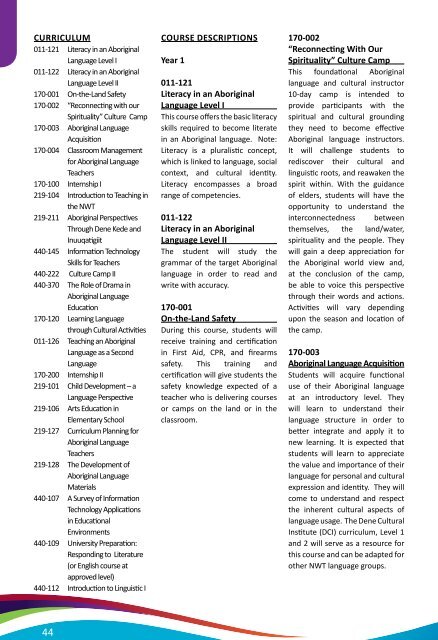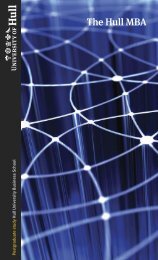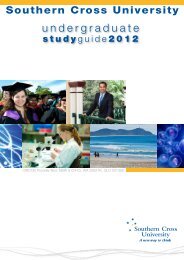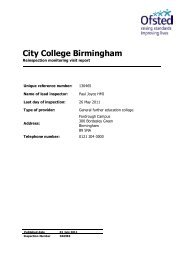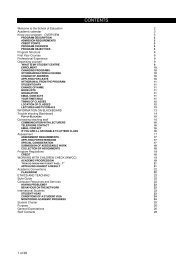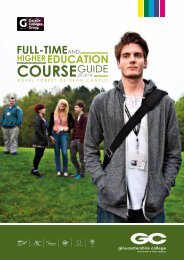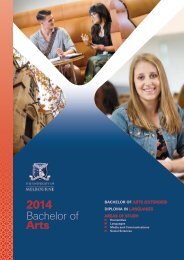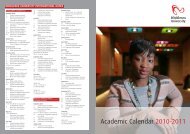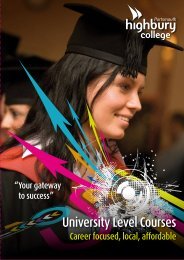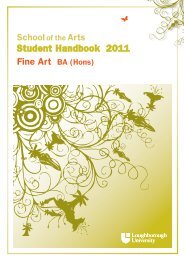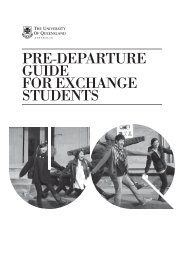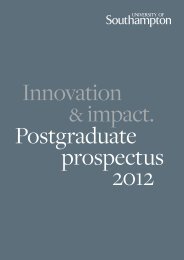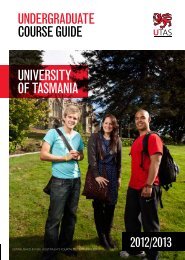2012-2013 AcAdemic cAlendAr
2012-2013 AcAdemic cAlendAr
2012-2013 AcAdemic cAlendAr
You also want an ePaper? Increase the reach of your titles
YUMPU automatically turns print PDFs into web optimized ePapers that Google loves.
CURRICULUM<br />
011-121 Literacy in an Aboriginal<br />
Language Level I<br />
011-122 Literacy in an Aboriginal<br />
Language Level II<br />
170-001 On-the-Land Safety<br />
170-002 “Reconnecting with our<br />
Spirituality” Culture Camp<br />
170-003 Aboriginal Language<br />
Acquisition<br />
170-004 Classroom Management<br />
for Aboriginal Language<br />
Teachers<br />
170-100 Internship I<br />
219-104 Introduction to Teaching in<br />
the NWT<br />
219-211 Aboriginal Perspectives<br />
Through Dene Kede and<br />
Inuuqatigiit<br />
440-145 Information Technology<br />
Skills for Teachers<br />
440-222 Culture Camp II<br />
440-370 The Role of Drama in<br />
Aboriginal Language<br />
Education<br />
170-120 Learning Language<br />
through Cultural Activities<br />
011-126 Teaching an Aboriginal<br />
Language as a Second<br />
Language<br />
170-200 Internship II<br />
219-101 Child Development – a<br />
Language Perspective<br />
219-106 Arts Education in<br />
Elementary School<br />
219-127 Curriculum Planning for<br />
Aboriginal Language<br />
Teachers<br />
219-128 The Development of<br />
Aboriginal Language<br />
Materials<br />
440-107 A Survey of Information<br />
Technology Applications<br />
in Educational<br />
Environments<br />
440-109 University Preparation:<br />
Responding to Literature<br />
(or English course at<br />
approved level)<br />
440-112 Introduction to Linguistic I<br />
Course Descriptions<br />
Year 1<br />
011-121<br />
Literacy in an Aboriginal<br />
Language Level I<br />
This course offers the basic literacy<br />
skills required to become literate<br />
in an Aboriginal language. Note:<br />
Literacy is a pluralistic concept,<br />
which is linked to language, social<br />
context, and cultural identity.<br />
Literacy encompasses a broad<br />
range of competencies.<br />
011-122<br />
Literacy in an Aboriginal<br />
Language Level II<br />
The student will study the<br />
grammar of the target Aboriginal<br />
language in order to read and<br />
write with accuracy.<br />
170-001<br />
On-the-Land Safety<br />
During this course, students will<br />
receive training and certification<br />
in First Aid, CPR, and firearms<br />
safety. This training and<br />
certification will give students the<br />
safety knowledge expected of a<br />
teacher who is delivering courses<br />
or camps on the land or in the<br />
classroom.<br />
170-002<br />
“Reconnecting With Our<br />
Spirituality” Culture Camp<br />
This foundational Aboriginal<br />
language and cultural instructor<br />
10-day camp is intended to<br />
provide participants with the<br />
spiritual and cultural grounding<br />
they need to become effective<br />
Aboriginal language instructors.<br />
It will challenge students to<br />
rediscover their cultural and<br />
linguistic roots, and reawaken the<br />
spirit within. With the guidance<br />
of elders, students will have the<br />
opportunity to understand the<br />
interconnectedness between<br />
themselves, the land/water,<br />
spirituality and the people. They<br />
will gain a deep appreciation for<br />
the Aboriginal world view and,<br />
at the conclusion of the camp,<br />
be able to voice this perspective<br />
through their words and actions.<br />
Activities will vary depending<br />
upon the season and location of<br />
the camp.<br />
170-003<br />
Aboriginal Language Acquisition<br />
Students will acquire functional<br />
use of their Aboriginal language<br />
at an introductory level. They<br />
will learn to understand their<br />
language structure in order to<br />
better integrate and apply it to<br />
new learning. It is expected that<br />
students will learn to appreciate<br />
the value and importance of their<br />
language for personal and cultural<br />
expression and identity. They will<br />
come to understand and respect<br />
the inherent cultural aspects of<br />
language usage. The Dene Cultural<br />
Institute (DCI) curriculum, Level 1<br />
and 2 will serve as a resource for<br />
this course and can be adapted for<br />
other NWT language groups.<br />
170-004<br />
Classroom Management for<br />
Aboriginal Language Teachers<br />
Reflecting on their own preunderstandings,<br />
traditional<br />
perspectives of NWT Aboriginal<br />
peoples, and the literature<br />
relative to creating safe and<br />
caring learning environments,<br />
pre-service Aboriginal language<br />
instructors articulate a personal<br />
vision for creating school and<br />
classroom climates in which<br />
students develop mutual respect,<br />
increasing self-discipline, and<br />
critical thinking.<br />
170-100<br />
Internship 1<br />
Prerequisites: 219-104 –<br />
Introduction to Teaching in the<br />
NWT<br />
The Aboriginal Language and<br />
Cultural Instructor Program<br />
internship is a four week teaching<br />
practicum in an NWT school.<br />
The student will work with an<br />
experienced cooperating teacher<br />
and an Aurora College internship<br />
supervisor during this four week<br />
period. During this internship,<br />
students will experience the daily<br />
work, routine, and interactions of<br />
a classroom Aboriginal language<br />
instructor. The intern will work<br />
towards partially assuming<br />
classroom responsibilities of the<br />
Aboriginal language instructor<br />
including planning, preparation,<br />
instruction, evaluation,<br />
assessment, reporting, and<br />
classroom management.<br />
219-104<br />
Introduction to Teaching<br />
in the NWT<br />
This is a survey course which<br />
introduces the pre-service<br />
teacher to the NWT philosophy<br />
of education, historical and<br />
contemporary perspectives of<br />
Aboriginal education, the role of<br />
the teacher in NWT communities,<br />
the planning and maintenance of a<br />
positive learning environment and<br />
several models of teaching. While<br />
students will be introduced to<br />
unit and year plans, the emphasis<br />
will be on planning lessons and<br />
using Aboriginal content and<br />
resources. The students will<br />
experience peer-teaching microlessons.<br />
Aboriginal perspectives<br />
will be an integral part of course<br />
delivery. Appropriate assessment,<br />
evaluation and reporting<br />
procedures will be threaded<br />
throughout the course.<br />
219-211<br />
Aboriginal Perspectives<br />
through Dene Kede and<br />
Inuuqatagiit<br />
Prerequisites: 219-104<br />
Introduction to Teaching in the<br />
NWT and/or 011-126 Teaching<br />
the Aboriginal Language as a<br />
Second Language.<br />
During this course, the students<br />
will be exposed to a wide variety<br />
of traditional and contemporary<br />
concepts related to Aboriginal life.<br />
The Dene Kede and Inuuqatigiit<br />
curricula will form the basis for the<br />
course content; effective/current<br />
teaching/learning strategies,<br />
related to the cultural concepts<br />
presented, will be incorporated.<br />
440-145<br />
Information Technology Skills<br />
for Teachers<br />
This course introduces the<br />
student to the basics of computer<br />
operations. Minor topics include:<br />
computer history and functions,<br />
basic troubleshooting, e-mail,<br />
the World Wide Web and the<br />
Internet. The main thrust of<br />
the course is to equip students<br />
with computer skills that will be<br />
required throughout the Bachelor<br />
of Education program. The<br />
students will develop competency<br />
in the Microsoft Office 2007 suite;<br />
specifically, Word, Excel, Access,<br />
and PowerPoint.<br />
440-222<br />
Culture Camp II<br />
This course focuses on the social<br />
construction of language, culture,<br />
knowledge and education in NWT<br />
Aboriginal society. The course is<br />
designed to be activity-oriented,<br />
which will provide students with<br />
opportunities to participate in<br />
various instructional/ learning<br />
pedagogy used by Aboriginal<br />
people when on the land teaching<br />
within the traditional cultural<br />
context.<br />
44 45


